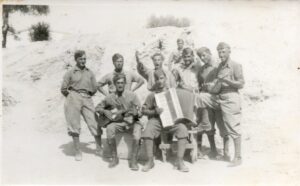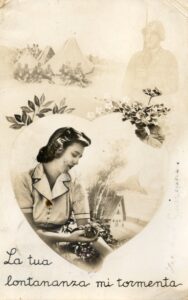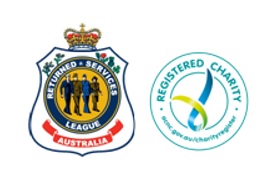 |
 |
As we move from Festa della Liberazione/ANZAC Day to Festa della Repubblica (2 June) – signalling the end of a terrible period of dictatorship and devastation – a touching vignette of humanity during war.
|
It was on the last day of October that Tom himself was wounded by an Italian Mortar. And it was Italian Prisoners of War who were tasked to take him back to the Medical Aid Post – so was the trust between the Australian and Italian soldiers to look after each other’s wounded even if captured. It wasn’t long, that Tom was even found by some comrades having tea and sharing cigarettes with other wounded Italian soldiers at the Aid Post. |
Read more about Tom story further below, in the short speech by Robert McNamara, Vice President of the RSL Macclesfield Sub-Branch. And here’s how we came to know of Tom Cosgrave’s story.
|
Recently a local family surrendered to the Sub Branch some archival records relating to a family member who served with the 2AIF in the African Campaign in World War 2. This person later died of wounds during one of the battles of El Alamein. These photographs that have laid untouched for over 80 years have been given to the Sub Branch, along with other items. Amongst them we have discovered photographs of Italian soldiers. These photographs were either taken off prisoners of war, from material left behind or deceased. They were posted back to Australia in 1941 or 1942. From the back of the postcode, we can see the post mark of Prignano which is understand is a small town south of Naples. We would very much like to return these photographs if possible to next of kin, or some authority in Prignano who can take charge of them. And as the town is only about 1,000 souls, we are hopeful that a family member can be found. Some of the remarks on the back of the postcard are unfortunate – but in 1941/42 the world was at war! Incidentally the soldier who wrote the words and sent the pictures and postcard home was a devout Catholic. As mentioned, he died of wounds in Nov 1942 – his younger brother being killed in action 1 year later in New Guinea. Paul Lemar Public Officer Returned & Services League – Macclesfield Sub Branch (1941-2022) https://www.facebook.com/MacclesfieldRSL/
|
Here is how Robert – himself a Veteran of Vietnam – described Tom’s story at our event 25 April 2023.
|
|
Good afternoon My name is Robert McNamara, Vice President of the RSL Macclesfield Sub-Branch and I would like to thank Adriano and the Italian Consulate of Adelaide for the kind invitation to be here today to commemorate Italy’s National Liberation Day and of course – ANZAC Day. I served in Vietnam in 1968 with the Australian Army. I’d also like to introduce my wife Colleen. Tim Eastwood – who served with me in Vietnam And Nat Lemar, Secretary of our Sub-Branch. Last year the Cosgrave family surrendered to Nat some old records relating to one of their family members who had served with the Army in the North African Campaign against the Italian Army in World War 2. His name was Thomas Cosgrave and their family are well known to our town. With the records were also some photographs and postcards, taken from material left behind after battle and posted back to his mother. She was my great Aunty and we don’t know why he posted them home to her? These photographs have lain untouched for nearly 80 years and are photographs of Italian soldiers from the small town south of Naples called Prignano. These men served with the 39th Infantry Regiment, Bologna. I’d now like to tell you the story of Thomas Cosgrave and how he ended up in North Africa in conflict with these men.
Thomas (Tom) was the eldest son of Thomas COSGRAVE & Catherine nee MCNAMARA and was born on the 28th of April 1918 at the Mt Barker Hospital, South Australia in the Adelaide Hills. This Friday will be his 105th Birthday. His parents had been married in May 1917 in the Saint James the Less Catholic Church, Macclesfield. Tom, his brother’s and sister – Denis, Phillip and Mary grew up in Macclesfield, on a farm, in a small town in the southern Mount Lofty Ranges. The town had been established soon after South Australian settlement in 1839 and was well known for its dairy farms. Tom came from a strong Catholic family upbringing, the family being of Irish descent. He was educated by Mary MacKillop’s Sisters of St. Joseph at their Convent School, next to the Church in Macclesfield. He and his family were also regular volunteers at the annual New Year’s Day Catholic Picnic. Tom was a keen sportsman and played Tennis, Football and Table Tennis with the local Clubs. He loved playing cards and won local tournaments in the 1930’s. With World War 2 commencing, and Australia again becoming involved in another European conflict, Tom joined the Army in 1940. His younger brother Denis also joined the Army later that same year. Both he and his brother would eventually be posted to the Middle East and North Africa serving in different Army Infantry Units – sometimes even not far apart, but sadly they never met. On Christmas Eve of 1941 Thomas wrote home describing the Holy Land as being as wet as the devil, cold as ice and as miserable as it could possibly be. Obviously for this young Australian – the Holy Land in December was cold and unpleasant place! But he wrote saying he had also received his Christmas cake from his mother, and it was absolutely beautiful as he shared it with his mates. A regular letter writer, his parents shared a letter with a local newspaper in which he mentioned how valuable letters and newspapers, especially the local ones, were valued by the men. He said – “mail is a real friend over here, and you couldn’t imagine how we read every line over and over again. Items about home are extra welcome”. Being half a world away from home, they cherished any news from home. Tom was involved in intense fighting during October 1942 with his Battalion down to 213 fit men after taking nearly 600 casualties. It was on the last day of October that Tom himself was wounded by an Italian Mortar. And it was Italian Prisoners of War who were tasked to take him back to the Medical Aid Post – so was the trust between the Australian and Italian soldiers to look after each other’s wounded even if captured. It wasn’t long, that Tom was even found by some comrades having tea and sharing cigarettes with other wounded Italian soldiers at the Aid Post. And with so many others, Tom was eventually evacuated to the Australian General Hospital back in Egypt, and despite the wound being relatively minor; he died of a blood clot, 6 days after being wounded. He was just 24 years old. In his last letter written to his parents from his hospital bed a couple of days earlier, he had described the hospital as a “little corner of heaven” – to be away from the bang of the shells, the whiz of flying shrapnel and the deadly contact of the machine guns. The sisters and the Voluntary Aids are marvellous and there are no words to describe them. His final line – Well Ma, I must say cheerio for now, please don’t worry, I’m OK! Tom is buried at the large Alexandria War Cemetery in Egypt. And with a sad twist of fate, nearly 12 months later, his brother Denis was killed in action in October 1943 in New Guinea. With Japan declaring War, Denis and his unit had been rushed back to defend Australia. He also is buried over-seas. The 1944, The Annual Catholic Picnic at Macclesfield saw the Premier of South Australia attend, and present the Cosgrave Memorial Cup in memory of Tom and Denis to the owner of the fastest horse on the day. The loss of the two brothers, devasted the Cosgrave family – especially Tom Senior who never recovered. The family plot in Macclesfield has the inscriptions of Tom and Denis engraved with their mother and father. The youngest brother Phillip was never allowed to join the Army. Lest We Forget all the Sailors, Soldiers and Airman who answered the call of their Country, both in Australia and in Italy. It is now, with great pleasure, that the Macclesfield RSL Sub-Branch and the Cosgrave family present these photographs to the Italian Consulate and hope that they are able to be reunited with the descendant families of these soldiers back in Italy. |

